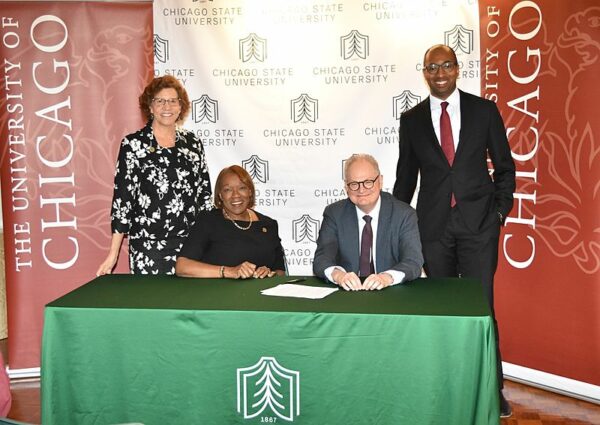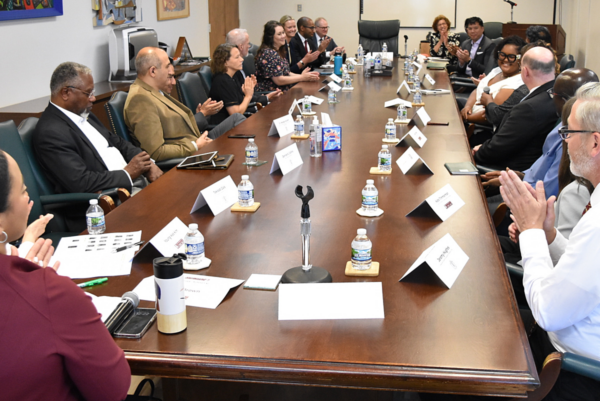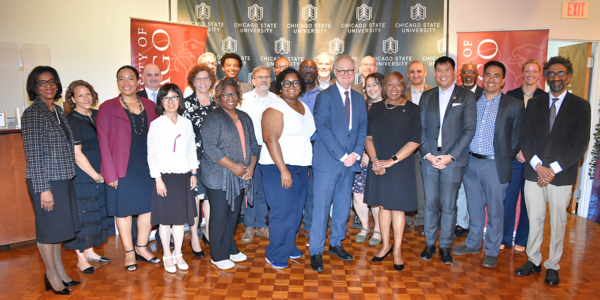The University of Chicago, Chicago State University formalize partnership meant to grow collaborations, build inclusive pathways to emerging scientific fields

The University of Chicago and Chicago State University (CSU) deepened their partnership Monday when the universities’ respective presidents, Paul Alivisatos and Zaldwaynaka “Z” Scott, signed a formal Memorandum of Understanding. The agreement aims to strengthen mutually beneficial collaborations between the two institutions in the physical, social, biological, and data sciences with an emphasis on education, research, employment pathway programs, and civic engagement.
More than 20 faculty, staff, and administrators representing both institutions were on hand at CSU’s Roseland campus during Monday’s signing ceremony and discussion. The group talked about existing collaborations the new agreement could help bolster and potential collaborations it could help build.
“We’ve had a partnership and it’s been growing, so now is a great time for us to mark the moment and say let’s build more,” UChicago President Alivisatos told attendees. “There’s a broad range of fields at the table here today—areas like bioengineering and medicine, climate and energy, data science and artificial intelligence, quantum information science and engineering, and more—and all of those areas represent our common interests to work together to develop the human talent that will advance innovation, make our local economy stronger, and help people to have wonderful, fruitful careers and lives. There are many more pathways for our faculty and students to interact so I can see huge potential and I’m excited to move forward.”
“We appreciate this relationship and are so glad to gather here for what I believe is a historic event—really looking at how a regional public university like Chicago State University can have a robust partnership with University of Chicago and making sure that not only do we thrive as institutions but that the students that we serve also thrive in rooms with one another,” CSU President Scott said.
The agreement is the latest development in a series of efforts to ensure the rapidly changing STEM field benefits from a wide range of perspectives and experiences and advance the goals of UChicago’s broader Inclusive Innovation initiative. Led by UChicago, the University of Illinois Urbana-Champaign, Argonne National Laboratory, and Fermilab National Accelerator Laboratory, the initiative aims to engage local students, educators, and workers and connect them to Chicago’s growing scientific ecosystem, thereby helping to generate a diverse talent pipeline in the sciences and spur economic growth on the city’s historically under-resourced South Side.
Expanding access
For recent CSU graduate Alayjah Harshaw, who shared her experience during the event, the partnership between CSU and UChicago has fostered new academic and professional opportunities. Harshaw participated in the Illinois Post-Baccalaureate Research Experiences for LSAMP Students (IPRELS) program, which placed her in a research role supporting neuroscience professor Bobby Kasthuri’s UChicago lab.

“The collaboration is extremely beneficial to me, not only to gain new information but to continuously be in rooms learning with people I wouldn’t see myself being in rooms with—different scientists, people doing extensive research that I might want to be involved in in the future—it’s just miraculous, and being introduced to other graduate students and researchers will lead me to other rooms so I’m very grateful,” Harshaw, who will soon take her MCATs and plans to apply to UChicago’s Pritzker School of Medicine, said. “University of Chicago and Chicago State are pillars of the South Side, and this can just open up so many more opportunities, not only with students but partnerships within the community—this MOU really opens a door for new ideas and new accomplishments.”
The benefits, Kasthuri said, go both ways.
“Every step along the way has been an incredible benefit for me and the lab. The students who it has been a pleasure to mentor have actually benefitted the lab and my own research more than we’ve benefitted them,” Kasthuri said.
Building on existing efforts
Other faculty, university leaders, and researchers in attendance highlighted the collaborative projects they’ve already established and spoke to ways the MOU might allow that work to be scaled or inform new projects.
David Uminsky, executive director of UChicago’s Data Science Institute, for example, pointed to the success of his department’s unique preceptor program, which places recent Ph.D. graduates working on their UChicago data science post-docs in dual teaching roles at both CSU’s campus and UChicago. Preceptors, who focus their post-doc experience more heavily on teaching rather than traditional research, receive faculty mentorship, professional guidance, and training in inclusive teaching practices from both institutions.
CSU Chemistry Professor Valerie Goss spoke of her work with UChicago Chemistry Professor Greg Engel leading a National Science Foundation (NSF)-funded Quantum research collaboration called The Quantum Leap Challenge Institute for Quantum Sensing for Biophysics and Bioengineering, or QuBBE, which brings together researchers from medicine, physics, biology, chemistry, and engineering to create new quantum sensors tailored for biomedical applications and ready the quantum technology workforce of the future.
“Quite often universities will want to partner with Chicago State University for large grants and generally when we are contacted, it’s at the end when the grant is just about done. That did not happen in this case. Greg reached out to me at the very beginning and we worked that proposal all the way through and I believe that’s why we were successful in our grant submission together,” Goss said. Just last week, Goss said, their program hosted local high school students who gave presentations on quantum-related topics. “It was quite moving,” she said. “These students are really focused on wanting to become physics majors and engineering majors and want to go into this field and they see themselves as being able to do this.”
The relationship between the two institutions has additionally offered crossover opportunities such as UChicago’s Social Sciences Division placing CSU students in research internships through their Summer Institute in Social Research Methods’ program, CSU students participating in summer on-campus stays at UChicago, the UChicago-based Chicago Quantum Exchange working with CSU to co-develop a series of NSF grant proposals, and preceptors from UChicago’s Data Science Institute helping to identify CSU student to fill reserved slots in their summer clinics and programs, among others.

Looking forward
Beyond deepening existing relationships and areas of work, this MOU, representatives from both institutions agreed, has the potential to encourage broader future impact, particularly as both universities reflect on additional ways to remove barriers and expand access for more students, faculty, and community members.
“Now is the time for us to say that we’re in this for the long haul and so we’re excited and we know that it’s going to benefit both of our institutions’ faculty, staff, as well as our students,” outgoing CSU Provost Leslie Roundtree said. “And hopefully we’re becoming change agents who can really make a difference on the South Side of Chicago.”
To continue to generate new opportunities for collaboration going forward, participating UChicago and CSU faculty and leaders plan to meet periodically to identify and advance new lines of work.
This story was republished from University of Chicago’s Office of Civic Engagement